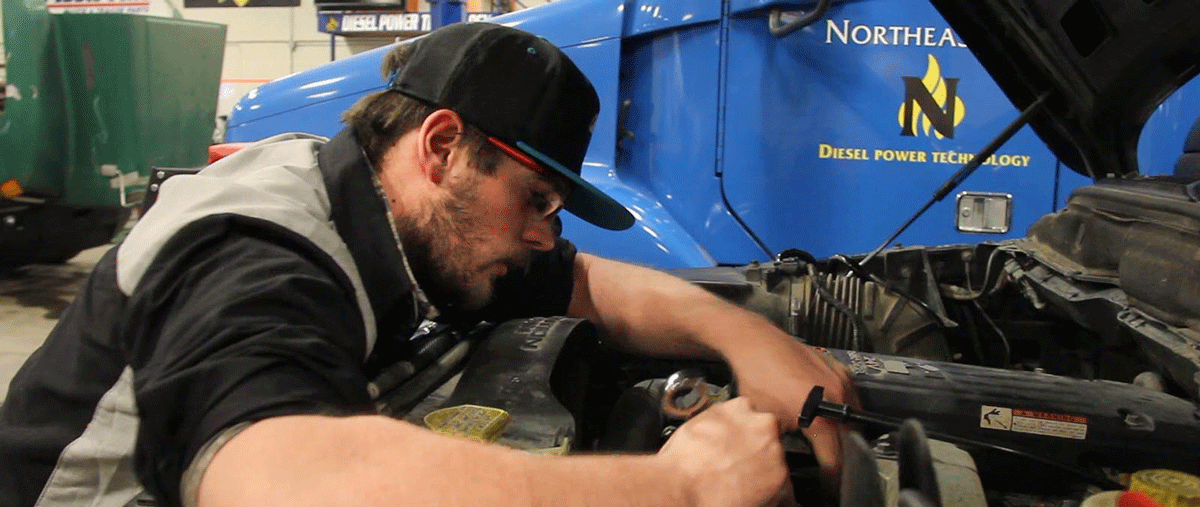Since first attending Northeastern Junior College back in 1979, Jimmy Atencio’s life has revolved around diesel technology. He's worked with diesel equipment on the farm, in machinery and vehicle dealerships, and in his own business. His career came full circle nine years ago when he returned to Northeastern to teach in the Diesel Technology program. Understandably, Atencio is incredibly proud of the industry to which he has dedicated his working life.
“Diesel technology is just so noble,” says Atencio. “It’s diesel technology that keeps America moving and puts food on our tables.”
What is Diesel Technology?
Diesel technology powers heavy-duty equipment found on farms, construction sites, and in the road haulage business.
“If you need power, you've got to have a diesel,” says Atencio. “Because diesel engines are so big, the torque, the gearing, and the transmission are so much more powerful than other engines. They are heavy-duty machines, and they are built to last.”
While diesel technology is known for its power and endurance, it’s also a thoroughly modern industry that is rapidly evolving to meet today’s workplace regulations and environmental concerns.
“It’s highly technical now,” says Atencio. “When I was young, it was a dirty and smokey industry. Diesel engines are so clean now; you don't even need an exhaust system in a building where you are running these new trucks.”
Changing regulations in the workplace also make a career in diesel technology more accessible to more people.
“In my day, back in the early '80s, you had to be pretty tough,” says Atencio. “I've broken bones and even lost part of a finger, but things have changed. There is no heavy lifting anymore. The limit here in Colorado is 50 pounds — if it weighs 50 pounds, one ounce, then there has to be some kind of device to lift it. The physical demands are not what they used to be; today, it’s a much more accessible job.”
What Do Technicians Do?
According to Atencio, students in the diesel technology program at Northeastern cover “everything from bumper to bumper and headlight to taillight.”
“Tires, brakes, steering and suspension, heating, ventilation, and air conditioning systems (HVAC) — it's all in the program,” says Atencio. “We also cover collision avoidance and computer communication in modern vehicles. We even look at the comfort systems in sleeper cabs.”
Atencio describes the diesel engine training courses as particularly intensive.
“We disassemble running engines, analyze them, understand them, and then we put them back together and run them just so students can see the outcome of their efforts,” says Atencio. “That's the only way it can be done right.”
Northeastern is able to provide such breadth and diversity in its diesel mechanic training programs thanks in part to its industry partnerships with companies like Freightliner, Waste Management, and John Deere.
“They send us everything that their technicians need to be trained on, and in return, I send them quality students,” says Atencio.
Recruitment Crisis
Despite all of the advantages of modern diesel equipment and increased diversity in the workplace, the industry faces a crisis when it comes to recruiting new diesel technicians.
“The recruitment crisis has been compared to a tsunami,” says Atencio. “Older technicians are retiring, and there is nobody there to fill the places. Big truck fleets are being parked because they don't have technicians to work on them.”
This shortage of skilled workers creates significant opportunities for graduates of the diesel technology program at Northeastern.
“I have no problem at all getting somebody into a $25-$30 an hour job if they show commitment and they put a lot of effort into this program,” says Atencio. “There is a big demand out there, so graduates can make some pretty good money, get great benefits, and go anywhere they want.”
According to Atencio, some of the companies that partner with the diesel technology program at Northeastern have upwards of 50 or 60 locations both locally and across the United States.
“I've had city guys stay out here in the country and make a career, and I've had country people tired of the country going to the city,” says Atencio. “There are opportunities no matter where they want to go.”
The U.S. Bureau of Labor Statistics projects steady growth for the profession through 2029, highlighting that the best job prospects will be for those who complete postsecondary training in diesel technology.
Best Diesel Tech Schools
Atencio believes that it’s not just the high-quality instruction and the support of leading companies in the diesel technology industry that makes Northeastern stand out among the very best diesel tech schools.
“There are other colleges with diesel mechanic programs, and they do a good job, but you don't always get the full college experience,” says Atencio. “We're next to the automotive program, the wind tech program, and the welding program, and they all get to know each other. Here at Northeastern, you can stay in a dorm, eat in the cafeteria, watch a basketball or volleyball game, and build the kind of friendships and memories that last a lifetime.”
Factor in the cost savings that Northeastern, as part of the community college system, can offer students when compared to larger and more expensive technical colleges, and there is no better place to start a career in diesel technology.
Learn More About Diesel Tech
To learn more about how an associate degree (AAS) in diesel technology from Northeastern can help you launch a career that can take you anywhere, visit the Diesel Technology program page on our website.


